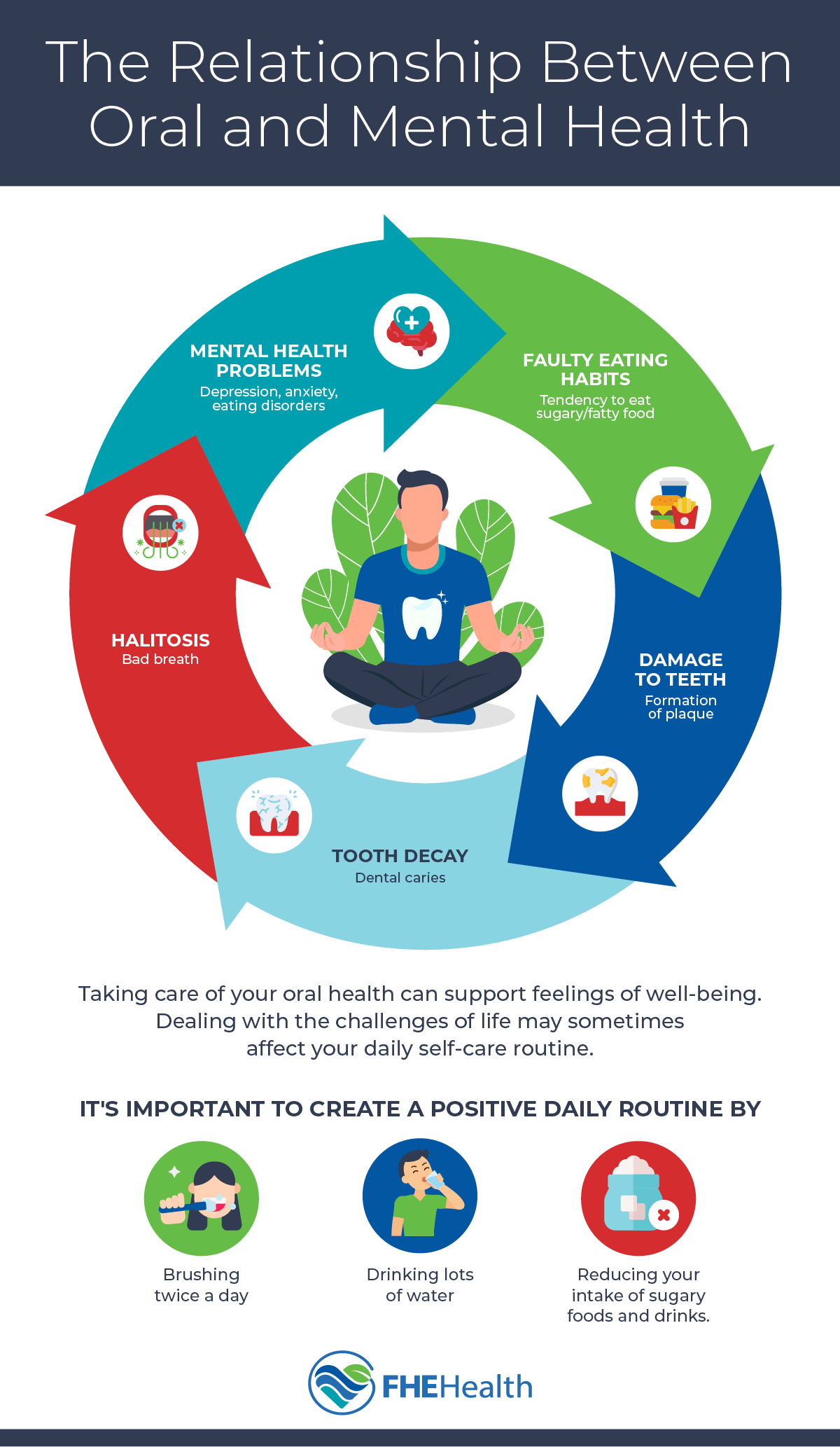
Studies have proven there exists a strong oral health-mental connection, often referred to as the mouth/body connection. This connection suggests that oral health isn’t separate from the rest of the body but instead links to multiple mental and physical processes. Signs such as a painful smile and periodontal disease often reflect an individual’s overall health, which is why it’s important to keep track of when you’re due for dental work.
Oral Health Practices and Their Impact on Mental Health
Maintaining good oral hygiene helps reduce the chances of developing certain diseases. This is because periodontal disease causes chronic inflammation in the gums, which can spread to other parts of the body and lead to systemic inflammation. Systemic inflammation occurs when the body’s immune system constantly sends signals to fight bacteria, which researchers have linked to cardiovascular disease, diabetes, Alzheimer’s and rheumatoid arthritis.
Feelings of temporary sadness are expected and commonplace in individuals adapting to ongoing treatments and those facing the reality of a chronic condition. This sadness often turns into depression, which can increase symptoms, thus creating a cycle of poor oral hygiene and mental well-being.
Poor oral hygiene also leads to tooth loss, staining, dental decay and bad breath, which cause poor self-esteem, social isolation and poor mental and overall health. It can also impact speech, which induces further isolation.
The CDC recommends the following daily practices for maintaining excellent oral hygiene:
- Consume fluorinated water and use toothpaste recommended by the National Dental Association.
- Brush your teeth at least twice a day and use floss to remove plaque between teeth and along gum lines.
- Schedule an appointment with a dentist at least once a year for an annual checkup.
- Quit smoking or using tobacco products, which can discolor teeth and lead to mouth disease.
- Limit intake of alcoholic beverages.
- Avoid medications causing dry mouth.
- If needed, receive adequate treatment to manage diabetes symptoms, as gum health directly affects blood sugar levels.
If you or a loved one receives support with ADLs or you’re a caregiver for an elderly or disabled individual, it’s always a good idea to prioritize oral hygiene — mental well-being can flourish as a result.

Psychological Factors Influencing Oral Health Behaviors
Psychological factors influence mental health, including beliefs, attitudes, coping mechanisms and motivation. Multiple psychological factors directly impact how individuals care for their teeth and gums.
- Perceived importance of oral hygiene. An individual’s attitude toward oral hygiene has a direct impact on whether they brush and take care of their teeth. Someone who views good oral hygiene as a priority is more likely to engage in regular flossing, brushing and dental checkups. Additionally, someone with positive attitudes about dental treatments is more likely to schedule regular dental visits, as opposed to those with negative misconceptions.
- Self-esteem. Those with high levels of self-esteem are more likely to pay close attention to appearances, including maintaining a healthy smile, while those with low levels of self-esteem may not care.
- Stress. High levels of stress impact oral health behaviors in various ways. Some may feel too tired to brush and floss at the end of a hard day, which leads to an increase in oral disease and tooth decay. Teeth clenching and grinding is also another common reaction to stress, which can lead to the wearing of the teeth and TMJ.
- Motivation. Motivation to fit in and fear of judgment from others may play a role in oral hygiene. Individuals may also feel motivated to have a white smile or to prevent dental problems.
- Individual support. Children usually learn the importance of good oral hygiene from their parents or a caregiver, which they carry with them as they get older. Children without role models and individual support may not get the education they need to properly take care of their teeth.
Addressing the Oral Health-Mental Connection Concerns in Dental Care Settings
Dentists often find it challenging when treating patients with mental health conditions. Taking into account the interactions between medications, for instance, or modifying the dental care process to accommodate anxiety can pose issues for those untrained in mental illness. Dentists can approach the problem in several ways to ensure optimal mouth health and mental health for their patients.
- Screening and assessment. During the initial intake process, dentists can screen for mental health issues to help identify patients at risk for both oral and mental health issues.
- Communication. Dentists should create an environment that encourages open communication about dental care and treatment concerns. Addressing these concerns can then be incorporated into dental care plans.
- Incorporate relaxation techniques. Help patients relax before and during dental appointments by teaching relaxation techniques, such as deep breathing and visualization. This promotes a sense of calmness and well-being.
- Create a compassionate environment. With dental health’s psychological impact in mind, dental offices should create an environment that invites and soothes their patients, especially those with mental illness. By providing a positive experience, dental offices can enhance a patient’s comfort and reduce anxiety, which can result in return visits and an appreciation for dental health.
Promoting Holistic Health Through Oral and Mental Well-Being
Promoting holistic health through oral and mental well-being involves understanding how much dental and mental health can impact one another. In treatment, health care professionals must create strategies that address both conditions to ensure individuals pay attention to their oral and mental health connection. This includes working with dentists to create a collaborative oral care plan.
Dentists may educate patients on the importance of excellent dental care and encourage regular dental screenings. Dental restorations may be used to foster better self-esteem, enhance an individual’s appearance and make it easier to eat and communicate. In addition, dentists may guide an individual towards healthy lifestyle changes that affect oral health, including limiting alcohol use, discouraging tobacco use and avoiding a high-sugar diet.
If you or someone you love struggles with mental health issues, our caring treatment approach can make a difference. Contact us at FHE Health to learn more about our available treatment options or speak with someone about your concerns.






